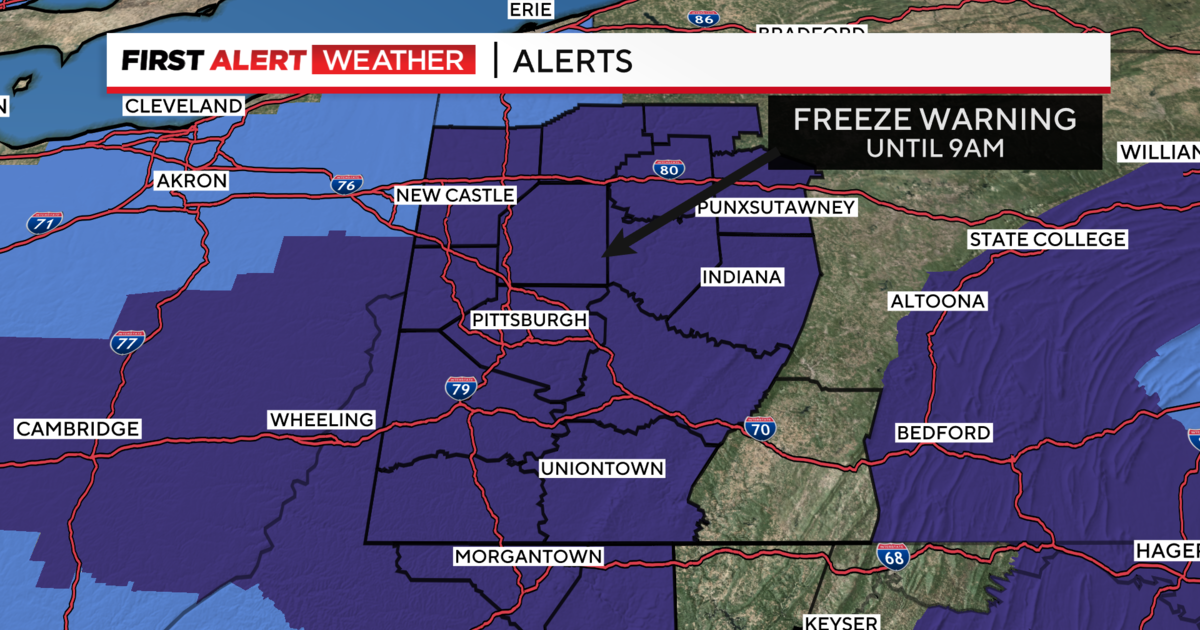Zika Outbreak Prompts Travel Warning For Area Of Miami
PITTSBURGH (KDKA/AP) - In a highly unusual travel warning, health officials advised pregnant women to avoid a part of Miami where mosquitoes are apparently transmitting Zika directly to humans.
Health officials last Friday announced that mosquitoes have apparently started spreading Zika on the U.S. mainland, citing four cases they strongly believe were caused by bites. Ten more cases were announced Monday, even though Florida authorities have yet to find any mosquitoes actually carrying the virus.
Of the 14 people infected, two are women and 12 are men. Eight patients showed symptoms of Zika, which can include fever, rash, joint pain and red eyes. The others had no symptoms. The disease is often so mild that most people don't know they are infected.
All 14 cases are thought to have occurred in Miami's Wynwood arts district, a trendy, fast-gentrifying neighborhood of warehouses, art galleries, restaurants and boutiques.
"It wasn't mosquitoes that made it from a Zika area to this area, it was people who had the Zika virus in their body. They were bitten by mosquitoes from this area," said Center for Disease Control Director Dr. Tom Frieden. "Those mosquitoes don't continue to spread it to other mosquitoes, they spread it to people. So, it goes from a person to a mosquito to another person."
Travelers heading to destinations in Florida were checking in at the Southwest Airlines desk at Pittsburgh International Airport Tuesday afternoon after the warning was issued.
"Just do the best to prevent breeding, keep the standing water and things away, and that's all you can do," said Kara Barkley, who was heading back to Fort Lauderdale with her young daughter.
Michele Fisher, who lives in Venice, Florida, is a microbiologist by trade and understands the Zika science, but she's a mom first and foremost.
"It's a little disturbing, especially thinking about the effects on a pregnancy and an infant," says Fisher. "I mean, that's scary. I have three kids; it's scary."
Unlike the Floridians heading home, Christine Meyer was putting her daughter, Stephanie, on a flight to Tampa to visit a friend.
"I'm trying to keep that as far out of my mind as possible and hope she has a good time visiting a friend," said Meyer.
At Gulliver's Travels they saw Zika impact Pittsburgh travel plans earlier this year when the virus made it to the Caribbean.
"We had people decide not to go or cancel," said Paul Busang, the president of Gulliver's Travels.
But, so far, that reaction has not surfaced among local travelers heading to south Florida.
"If you look at one of those Royal Caribbean ships that leaves ever week with 5,000 people, you know they're driving or they're connecting or they're getting on a ship in Miami, and we're not hearing of any rash cancellations," says Busang.
Those in the travel industry are hopeful the CDC and Florida health officials can keep the virus contained to that area in Miami, because if it spreads beyond that, they're concerned the casual attitude of travelers today could change markedly.
More than 1,650 cases of Zika have been reported in U.S. states. Nearly all have been the result of travel to a Zika-stricken country or sex with someone who was infected abroad, but now more than a dozen people have been infected in the U.S.
In Pennsylvania, health officials have confirmed 61 cases of Zika with results pending for 250 tests.
Florida health officials said they have tested more than 200 people in Miami-Dade and Broward counties since early July. An emergency response team from the Centers for Disease Control and Prevention will help Florida authorities investigate the outbreak, collect samples and control mosquitoes.
Scott asked for a CDC emergency team to help Florida combat Zika, which has been sweeping Latin America and the Caribbean in recent months and now may be gaining a long-dreaded foothold in the U.S. The White House said a team will be sent quickly.
"We will continue to keep our residents and visitors safe utilizing constant surveillance and aggressive strategies, such as increased mosquito spraying, that have allowed our state to fight similar viruses," Florida Gov. Rick Scott said in a statement Monday.
Government health officials warned pregnant women Monday to avoid the Zika-stricken part of Miami and told couples who have been there recently to put off having children for at least two months, after the number of people feared infected through mosquito bites in the U.S. climbed to 14.
The CDC also said expectant mothers should get tested for the virus if they have visited the neighborhood since mid-June.
Jordan Davison and Melissa Felix work for a cruise line and were enjoying their day off Monday looking at Wynwood's spray-painted murals.
"It's not like a big thing, right?" the 25-year-old Davidson said. "It's kind of freaky. There's so much going on we didn't know, didn't really think about it. ... I might wear bug spray going forward."
CDC officials said they could not remember another time in the 70-year history of the disease-fighting agency when it told members of the public not to travel someplace in the U.S.
Zika infections in pregnant women can cause severe brain-related birth defects, including extremely small skulls. The global outbreak has led to more than 1,800 serious defects.
The virus can linger in the blood and urine for weeks and has been found in sperm for months. As a result, the CDC said men and women who have recently been in the affected area should wait at least eight weeks before trying to conceive a child. And men who have had symptoms of Zika should wait at least six months, the CDC said.
The travel warning covers an area of about one square mile in Wynwood to the east of Interstate 95 and south of I-195. It's large enough, health officials said, to provide a buffer around the suspected hot zone. The tropical mosquito that spreads Zika travels less than 200 yards in its lifetime.
Dr. Peter Hotez, a tropical medicine expert at the Baylor College of Medicine in Texas, said the CDC should be more cautious and expand the travel advisory to all of Miami-Dade County.
"If you're pregnant or think you might be pregnant, avoid travel to Miami, and possibly elsewhere in South Florida," he said. "I'm guessing most women who are pregnant are doing that. I don't think they're sitting around waiting for the CDC to split hairs and fine-tune it to a specific area."
Dr. Frieden said the narrowly drawn warning was dictated by science and not by any concern for Florida's crucial tourism industry. He said it was based on the nation's ability to contain previous outbreaks of other diseases carried by the same mosquito.
"There wouldn't be a technical or scientific basis to give a broader recommendation," Frieden said.
Speaking Tuesday morning on ABC's "Good Morning America," Frieden said officials were finding it hard to eradicate the mosquito in the affected area.
"It could be that the mosquitoes there are resistant to the insecticide being used," he said, adding that it could take weeks for federal and state officials to figure that out.
He also said mosquito control is difficult in that neighborhood.
"This is an unusual neighborhood, or an emerging neighborhood," Frieden said. "It's mixed use. It has industrial, business and residential and that makes mosquito control very complex."
Join The Conversation On The KDKA Facebook Page
Stay Up To Date, Follow KDKA On Twitter
(TM and © Copyright 2016 CBS Radio Inc. and its relevant subsidiaries. CBS RADIO and EYE Logo TM and Copyright 2016 CBS Broadcasting Inc. Used under license. All Rights Reserved. This material may not be published, broadcast, rewritten, or redistributed. The Associated Press contributed to this report.)



